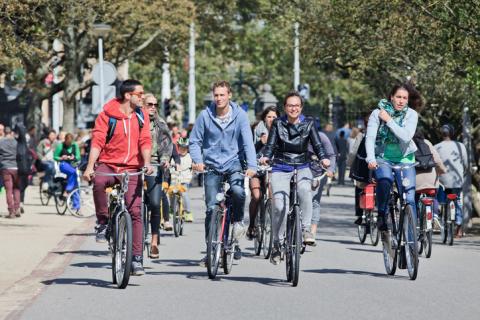Choosing to study international business administration (IBA) at Rotterdam School of Management (RSM), Erasmus University in the Netherlands was one of the best decisions I ever made.
The Netherlands is a friendly country that is tailored to international students, so don’t be afraid to start your international adventure here. You don’t even need to speak Dutch because many of the degrees are in English, and that is a big advantage.
On a personal level, studying abroad is such an enriching experience. It allows you to meet people from a wide variety of countries, which opens your mind and gives you a view of the world that you wouldn’t get by staying in your country of origin. You also encounter many learning experiences and grow as an individual, especially in the first few months after you arrive.
However, this adventure brings many challenges, both academic and extracurricular. IBA attracts the largest number of applicants in the country, so the academic level of the students and the expectations are high, and this is reflected in all areas.
The educational style is based on self-study, which means that you have very few classes each week and a lot of free time to organise yourself. But this style of learning still requires many hours of individual study. You need to learn to build your schedule and keep track of classes and assignments, which is the first big change compared with high school.
Courses are usually divided into lectures and workshops. Lectures are held in large rooms where the professor teaches theoretical content and usually there is no opportunity to go over the lesson or answer questions on the spot. Workshops, on the other hand, involve smaller groups of about 30 people in a much more practical approach taught by a teaching assistant, who is usually a student from the year above you.
Graduate employability: top universities in the Netherlands ranked by employers
Most international universities in the world
Five reasons why you should study abroad
The teaching pace is quite fast, covering between two and five subjects and lasting from seven to 11 weeks maximum to cover the broader topics taught during the three-year degree. However, in reality you often have less than three years to cover everything because some time will be spent completing internship opportunities or exchange programmes. You can also study minor subjects and must complete a thesis, something that will also take time away from your main study topics.
In my university there are many opportunities for international students to get involved. Sports clubs and associations are a great attraction for students and one of the driving forces of the university. There are all kinds of associations, mainly multicultural, which help students integrate more easily into this new environment. For example, I am the international business fair officer of International Students Rotterdam (ISR), and there are other associations for finance, photography, marketing, consultancy, entrepreneurship and so on.
The low number of class hours and high level of personal time means that you can try different activities based on your interests. This is especially popular in the second year when people look for part-time jobs and get deeply involved in the associations. For example, I am on two different boards, the ISR and the Erasmus Centre for Entrepreneurship (ECE). You can also consider doing an internship while you study, which is less common in other countries.
The Netherlands is a relatively small country with great train connections between cities, which makes it easy to get around quickly. Nightlife tends to take place during the week here in Rotterdam, mainly on Tuesdays and Thursdays, when the clubs organise the most popular parties for students. The biggest party to look out for is 27 April, King’s Day, when everyone dresses up in orange and takes to the streets to celebrate.
A big concern I had before coming here was my safety when riding a bike. I was relieved as soon as I arrived – the cities are fully prepared, with both drivers and pedestrians aware of the presence of bikes and trams, making it very easy for me and my friends to travel to university every day. If you respect the rules of the road, the risk of having an accident is very low. The Netherlands also has a wonderful variety of shops that sell products from many different cultures, so you can cook your own national dishes.
Overall, I would recommend studying in the Netherlands, not just because of the high quality of the universities, but also because of the safety, the quality of life and the opportunities the country has to offer.

Comments